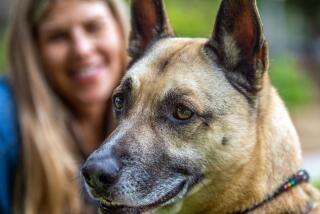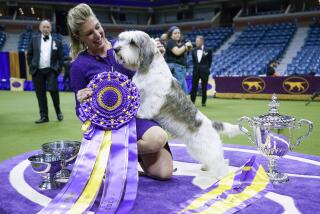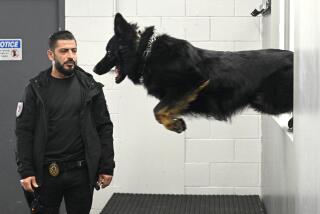Companion Dog Excellent
- Share via
I hear a lot of people talk about how they don’t want “all that show dog, robot training” for their dogs. Some people say this because they make good money saying it on TV. Other people say it because they can’t train dogs. And other people say it because they’ve heard someone say it on TV.
And some people say it when they meet Deborah Ryan and Major. They say, “That’s a nice dog--not like those robot-trained show dogs, but a natural dog.”
This is about as bizarre as the world ever gets, because Major, age 5, placed fourth in the 1985 national superdog trials last December at the Long Beach Convention Center. This is a competition to determine which are the best of the nation’s best robot-trained, automaton show dogs. And Ryan, a checker at the Alpha Beta near her home in a small town east of Los Angeles, is one of the nation’s top amateur handlers of doggie automatons.
Major usually goes simply by the name Major, but he is entitled on formal occasions to use the name OTCH, Ryan’s Major Golden Glow, CD, CDX, UD. Written out, that’s: Obedience Trial Champion, Ryan’s Major Golden Glow, Companion Dog, Companion Dog Excellent, Utility Dog. However, that’s quite a mouthful when you’re laughing at Major, or with him, so when Ryan walks in the door and is greeted by an eager dog who is either carrying something in his mouth (he takes greetings seriously) or showing his unique grin--which he uses when he can’t find anything to grab and carry to the door--she just says, “Howdy, Major. How’s tricks?”
Sometimes she used to say, “Major! The mailman’s here!” Ryan used to have a mail carrier who knew Major, and Major was always sent to bring in the mail. There’s a new mailman now, and Ryan doesn’t know yet if he’s nervous about dogs, so Major is learning to open the mailbox by himself.
I of course wanted to know if we were dealing here with a real Companion Dog, not one of those phony show dogs, so I said, “Well, that’s pretty good about the mail, but what about slippers and the newspaper?” Ryan said, “Newspapers? Sure. The only problem is that when we go out for walks and he sees someone else’s newspaper, he wants to fetch that too. In fact, he’ll retrieve anything. At dog shows I can ask him to bring me equipment and things from the tack box.”
She paused, and then confessed: “Of course, he doesn’t always bring the thing I ask for. But he always brings something.”
I asked, “What about tricks?”
Ryan laughed and said, “Oh, yes, tricks. Let’s see--he sits up like a poodle, crawls on command, and I’d like to teach him to grin on command, but he hasn’t gotten it yet. He only grins when he wants to.”
Only grins when he wants to! Major is sounding less and less like a robot. I asked about further ambitions. “Well, we’re doing a little fieldwork now, just for the exercise, but I guess we’ll show him.”
They are doing field-trial work--difficult work, usually done only by professionals, into which some dog owners pour an enormous amount of money--”just for the exercise.” Remember that the next time you hear that field-trial dogs are the toys of the wealthy. And the next time you hear that show dogs of any sort are the toys of the wealthy, remember that Major was bought from a breeder in Yucaipa.
I asked Ryan why in the world she is putting all that time into a dog who has nothing fancy in the way of pedigree. “Oh, I guess I just like him,” she said.
That’s why the American Kennel Club promotes competitions in which dogs earn the title Companion Dog Excellent. Some people just like their dogs, and show training is a way to just like your dog.
More to Read
Sign up for Essential California
The most important California stories and recommendations in your inbox every morning.
You may occasionally receive promotional content from the Los Angeles Times.













